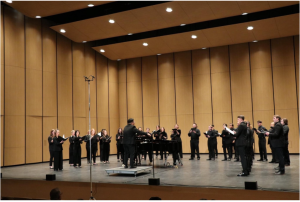
Hwanwook Lee: Unlocking the Emotional Core of Choral Music Through Collaborative Spirit
Hwanwook Lee, a distinguished figure in the global music scene, is renowned not only for his multifaceted talents as a conductor, educator, composer, and scholar but also for his profound philosophy of bringing heartfelt emotion to the forefront of musical performance. With a career that spans diverse cultures and countries, Lee has cultivated a unique artistic style that respects traditional foundations while embracing innovative approaches to inspire genuine expression.
With over a decade of international experience in choral conducting and music education, Lee has earned widespread respect in both academic and professional music circles for his dedication to musical excellence, cultural exchange, and education. His impressive academic journey includes a Doctor of Musical Arts in Choral Conducting from Texas Tech University, complemented by two Master of Music degrees from Missouri State University and Hansei University, and a bachelor’s degree in Church Music from Seoul Theological University.
During his doctoral studies at Texas Tech, Lee served as an Instructor of Record, leading the Matador Singers and University Singers, and contributing as an associate conductor for the University Choir and Scarlet Voce. He also held the significant role of Chorus Master for the opera production ‘La Clemenza di Tito.’ His recent leadership as the Associate Choir Director at Odessa High School in Texas saw him lead six ensembles, significantly enhancing the choral program’s overall quality.
Previously, Lee dedicated over ten years to church music in South Korea, directing adult and youth choirs, founding a prize-winning youth ensemble, and orchestrating numerous musical selections and performances. His expertise even led to an invitation as a guest artist at Heavenly Light Korean Methodist Church during his time in the U.S.
Leading with Emotion: A Philosophy of Connection
At the heart of Lee’s teaching and conducting lies a deep conviction that “emotional expression is the most essential element in music.” He passionately believes his role is to guide musicians beyond mere note reproduction, encouraging them to tap into the emotional landscape of a piece.
“My goal is to guide musicians to connect with the emotional world within a piece, so they don’t simply reproduce the notes but express something meaningful,” Lee explains. “I encourage them to link the emotions in the music with their own personal experiences, and to share that with the audience. When this connection happens, their performance naturally becomes more genuine and expressive. I see it as my role to help each musician discover their own emotional entry point into the music.”
For Lee, rehearsals are not just about technical drills but “spaces for emotional exchange and interpretation.” He fosters an environment where genuine communication is paramount, often posing questions that prompt reflection rather than just correct answers. “I often ask questions like, ‘What does this line feel like to you?’ or ‘If this were a conversation, what would you be trying to say?’” he shares.
“These questions help shift the focus from just ‘playing correctly’ to actually communicating something. I want the singers to feel that their role is not just to construct the music, but to convey a message—to make the music mean something real for both themselves and the audience.”
Composing and Inspiring: A Korean Perspective
Lee’s nuanced understanding of emotional depth is further enriched by his Korean heritage, though he stresses that genuine emotion cannot be forced. “I don’t believe in forcing it or trying to emphasize it in a technical way,” he asserts. Instead, he provides historical and cultural context, trusting that “true emotional expression only happens when the performers genuinely resonate with the music.” He focuses on creating an environment where emotion “can emerge organically,” recognizing that for one person, a piece might evoke sorrow, while for another, comfort or hope. “Emotion in music isn’t something you perform on command—it’s something that happens when understanding becomes empathy, and sound becomes connection,” he concludes.
This philosophy resonates deeply in his own compositions, which often blend Korean melodic elements with Western choral music. His poignant piece, “A Change of Heart,” stands as a testament to this, having been performed in 2013 at the “Innovative Choral Seminar” hosted by the Korea Church Music Association, one of the largest and most influential gatherings of its kind. The work, selected from the sacred choral collection “Jesus, My Joy Vol. 14,” was brought to life by the esteemed Changwon City Choir, one of Korea’s leading professional choirs, under the direction of Professor Euijoong Yoon, to an extensive audience of church musicians.
Recalling the profound impact of this event, Lee states, “To feel my music resonating across the stage and reaching people’s hearts was an unforgettable experience, and it remains one of the most powerful motivators in my artistic journey.” This performance solidified his commitment to both composition and conducting, demonstrating the power of music to convey a personal statement of faith and evoke genuine emotional responses.
A recipient of honors such as the Outstanding Graduate Student award at Texas Tech University and recognition for his teaching contributions, Hwanwook Lee continues to be a respected and influential figure in choral music. His active involvement in professional organizations like the American Choral Directors Association and the Korean Church Music Association further underscores his dedication. His commitment to fostering emotional authenticity, cultural exchange, and collaborative creation leaves an indelible mark on both his students and the broader musical community, solidifying his legacy as a conductor who truly leads with heart.